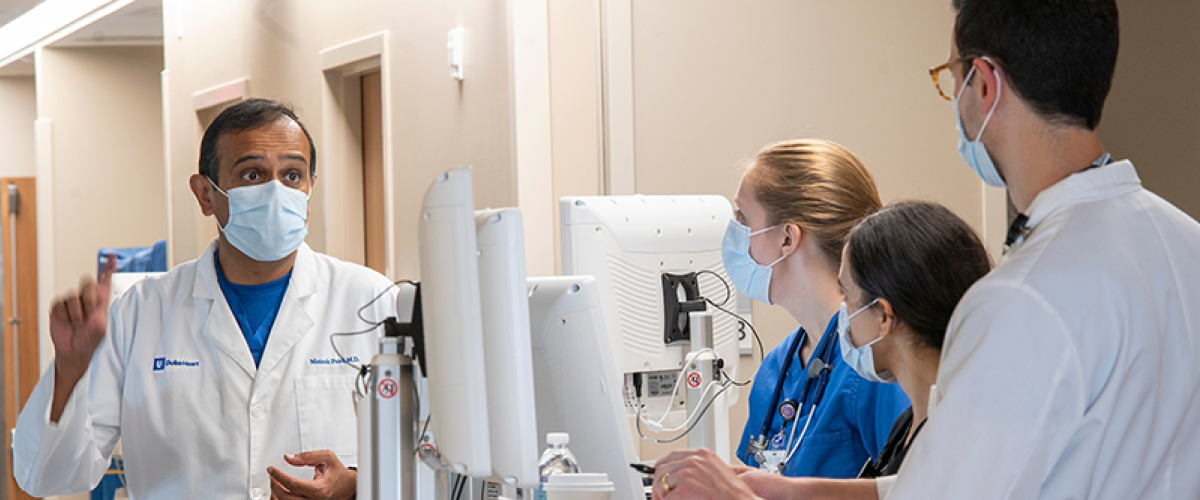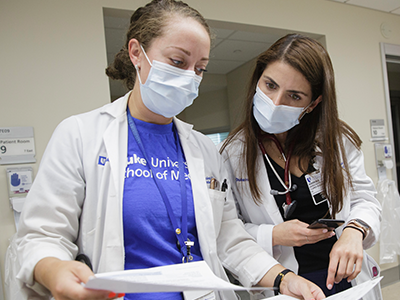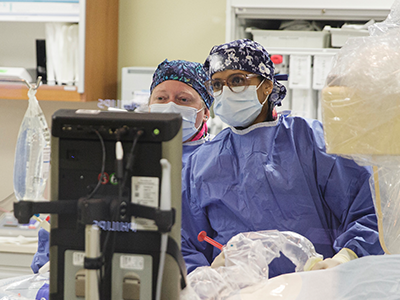
A combination of clinical rotations, simulation, didactics, procedures, mentored research and self-directed learning prepare fellows to be future leaders in Cardiovascular health. Fellows participate in the following activities during the cardiovascular fellowship program:
Clinical Rotations
Our clinical rotations emphasize fellow autonomy and clinical decision-making with direct faculty supervision. Fellows in our program gain independence in clinical judgment and procedural skills with this interaction, which is bolstered by outstanding clinical volume, as well as numerous core curriculum and sub-specialty conferences.
The clinical curriculum in our program is designed to meet COCATS 4 recommendations by the American College of Cardiology for both procedural volume and training time for competency in Cardiovascular Disease. Specific rotation requirements include:
| Cardiac Intensive Care Unit | 4.5 months |
| Cardiac Catheterization | 4 months |
| Electrophysiology | 2-3 months |
| Imaging (Echo, Nuclear, Cardiac MRI, Cardiac CT) | 7-9 months |
| Heart Failure/Transplant | 1-2 months |
| Valvular/Congenital | 1-2 months |
| Vascular/Prevention | 1 month |
| Outpatient Clinic | 1/2 day per week |

| Sample Schedule 1: Clinical Focus | Sample Schedule 2: Advanced Imaging Focus | Sample Schedule 3: Research Focus | Sample Schedule 4: Research and Clinical Focus |
|---|---|---|---|
| Echo - 3 months | Echo - 6 months | Research - 12 months | Research - 12 months |
| Nuclear Cardiology - 3 months | CT - 3 months | Outpatient Clinic - 1/2 per week | Echo - 1 day per week |
| Consultative Cardiology - 1 month | Nuclear Cardiology - 3 months | Elective - varies | Outpatient Clinic - 1/2 day per week |
| General Cardiology Inpatient - 2 weeks | OR | Vacation - 1 month | Vacation - 1 month |
| Heart Failure Inpatient - 2 weeks | Echo - 6 months | ||
| Elective - 2 months | Cardiac MRI - 6 months | ||
| Outpatient Clinic - 2 months | Outpatient Clinic - 1/2 per week | ||
| Vacation - 1 month | Vacation - 1 month |
Duke Subspecialty Fellowship Training Programs (Optional):
- Advanced Heart Failure and Transplantation (ACGME) - 1 year
- Adult Congenital Heart Disease (ACGME) - 2 years
- Clinical Cardiac Electrophysiology (ACGME) - 2 years
- Interventional Cardiology (ACGME) - 1 year
- Critical Care Medicine (ACGME) - 1 year
- Clinical Informatics (ACGME) - 2 years
- Cardiology Research Pathway (non-ACGME) - 1 year
- Structural Heart Disease (non-ACGME) - 1 year
Procedures
Fellowship training at Duke meets training recommendations of the American College of Cardiology (COCATS). Procedural volume is tracked throughout training by the specific laboratories (Cardiac Catheterization, Echocardiography, Electrophysiology, Nuclear Cardiology, MRI) and by a self-reporting system.

- Cardioversion
- Insertion and management of temporary pacemakers including transvenous and transcutaneous
- Programming and follow-up surveillance of ICDs and permanent pacemakers
- Bedside right heart catheterization
- Right and left heart catheterization including coronary arteriography (>200 cases)
- Exercise stress testing
- Echocardiography (Perform 150, Interpret 150, TEE 50, Stress Echo 100)
- Electrocardiograms (> 3500)
- Ambulatory ECG recordings
- Radionuclide studies of myocardial function and perfusion
- Cardiac magnetic resonance imaging
- Intra-aortic balloon counterpulsation (insertion and management)
- Pericardiocentesis
Evaluations
The Duke Cardiology Fellowship program uses many formats for assessment, most of which are collected and documented electronically through the trainee reporting system, MedHub. These include evaluations at the conclusion of each month’s rotation by faculty, peers, other health-care providers, and/or patients. For each clinical rotation/experience, fellows should receive a face-to-face meeting with a faculty member and a written evaluation from each faculty member with whom the fellow worked. In addition, there is a twice yearly program director summative evaluation: In this evaluation fellows meet individually with the program director to review their files, procedure logs, lecture attendance, research project progress and to develop individualized learning plans. Each fellow's progress toward clinical competency and independent practice is also reviewed every 6 months by our Clinical Competency Committee, with an assessment based on ACGME Milestones for the core competency domains.